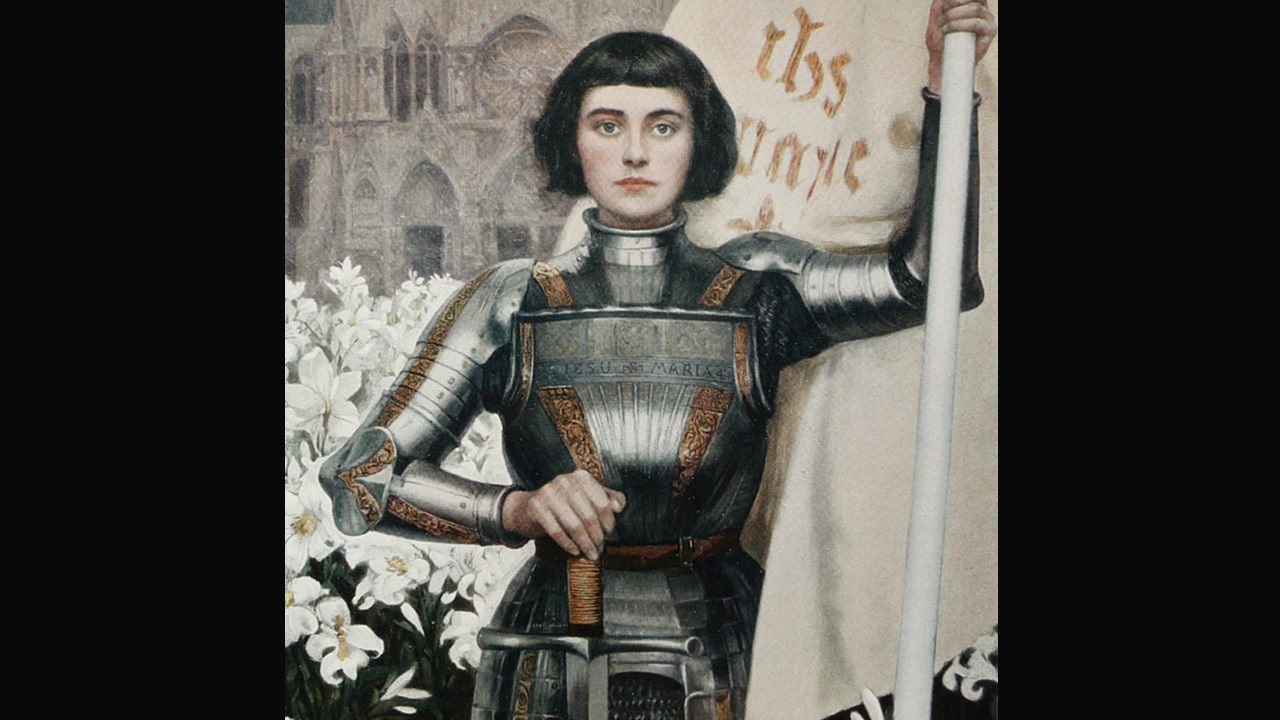.
The Duke D’Alençon Meets Joan of Arc
What task from the dauphin comes to me hence?
A lowly maid now seeks his audience.
This Joan, a girl from province unheard of,
They say she can hear voices from above.
I care not for such things, but like the rest
Of wenches whom I’ve bedded can attest:
Tonight we travel, my chance won’t be missed.
I’ll have my way with her, she can’t resist.
Lo, there she is! But say, what can it be
That strikes my heart beyond what eyes can see?
One look at her and all my thoughts are changed
From carnal lusts to purity exchanged.
The presence of this maid does overwhelm
As if she came down from angelic realm.
The thoughts that flood my mind are only chaste.
We journey on, my wicked plans erased.
The morning comes, to Chinon we’ve arrived.
Her holy presence has my faith revived.
The whole night in my carriage she did pray
And my poor soul now sees the light of day.
As she departs, I cry, “Pray for me, Joan!”
A solemn nod, she leaves me all alone.
Mon Dieu! I now repent, I’ll fight for Thee!
Thanks be for sending Joan to rescue me.
.
.
Mr. Ben Broussard lives in New Orleans, Louisiana. He is a full time volunteer with the American Society of the Defense of Tradition, Family and Property (TFP).















Thanks for this, Mr. Broussard. I hope your good example prompts more poems on this site about the saints, sanctity, and conversion.
I don’t quite follow the grammar of the passage “but like … can attest.” But you’ve nonetheless eloquently presented a powerful instance of holiness.
The little difficulty is explained by the long separation of subject and verb in a sentence with compound predicate: “I care not . . . but [I] can attest”
Thanks, Margaret. I think maybe it was the comma after “bedded” that I missed more than the 2nd understood “I”–not that the comma should be there if “I” is not.
Thank you, Julian, for your kind comment.
Apologies for the lack of clarity in the line you mention. That is the only line in the poem that continues into the next. “but like the rest Of wenches whom I’ve bedded can attest” is intended to show his depravity. These other wenches can attest to his never missing a chance for promiscuous relations, and he intended no exception for Saint Joan of Arc. Little did he know his task of giving her safe transport would lead to his conversion and repentance.
To quote Paul Claudel: “Youth was not made for pleasure, but for heroism.” May God raise up pure heroes like Saint Joan of Arc for today’s battles.
Ben, this is a wonderful picture of Joan as a powerful saint, whose very presence works miracles for those who encounter her. In this case, it is all the more remarkable because the Duke hasn’t the slightest wish for the miracle of “purity exchanged.” And he not only receives it but accepts it!
The final surprising lines show Joan as a Christlike intercessor for an individual, and connect as well to her God-given task of saving her country. Her work not only threw off unjust English domination in her own time, but preserved much of France from the political Protestantism of Henry VIII a century later. Your final lines demonstrate the fervor with which Joan’s all-male army fought under command of this holy virgin, who insisted on Mass at dawn every day.
One little criticism is the combination of archaic and new verb forms. If you are going to use “doth” and “hath,” you should also use “cometh,” “seeketh,” “striketh,” “seeth.” I would think it better to use “does” and “has,” to avoid translation of the whole poem into archaic English. I would not, however, object to “Thee” as an archaic pronoun for God, as this is generally recognized to be a reverential exception to the rule.
Thank you, Margaret. This true story is but one of many from her short life to show she was God’s instrument for the restoration of France and of individual souls. Her righteous indignation put a swift end to blasphemy, swearing, gambling, and impure vices wherever she went. Though only 19 when burned at the stake, Saint Joan of Arc’s heroism and saintly virtue shine for all time.
Your criticism is 100% valid and I had submitted a revision correcting what you mention, but it must not have gotten to the right person before publication. I am still new to this site, so your patience with me is beyond exemplary.
May Saint Joan of Arc intercede for you in all your endeavors.